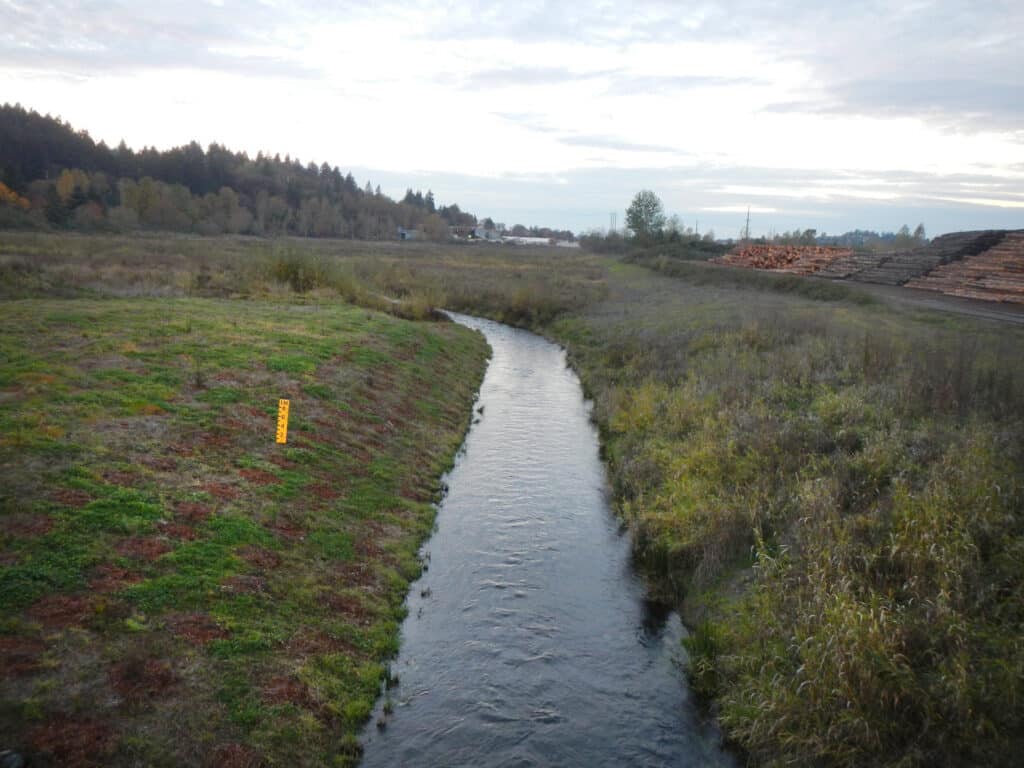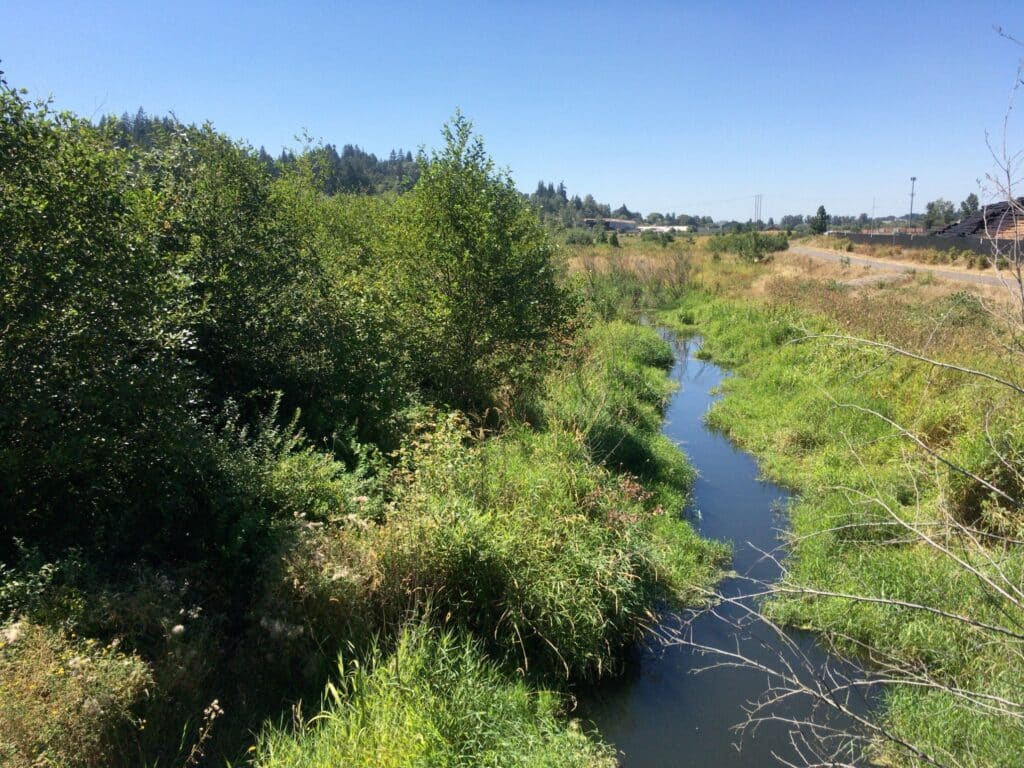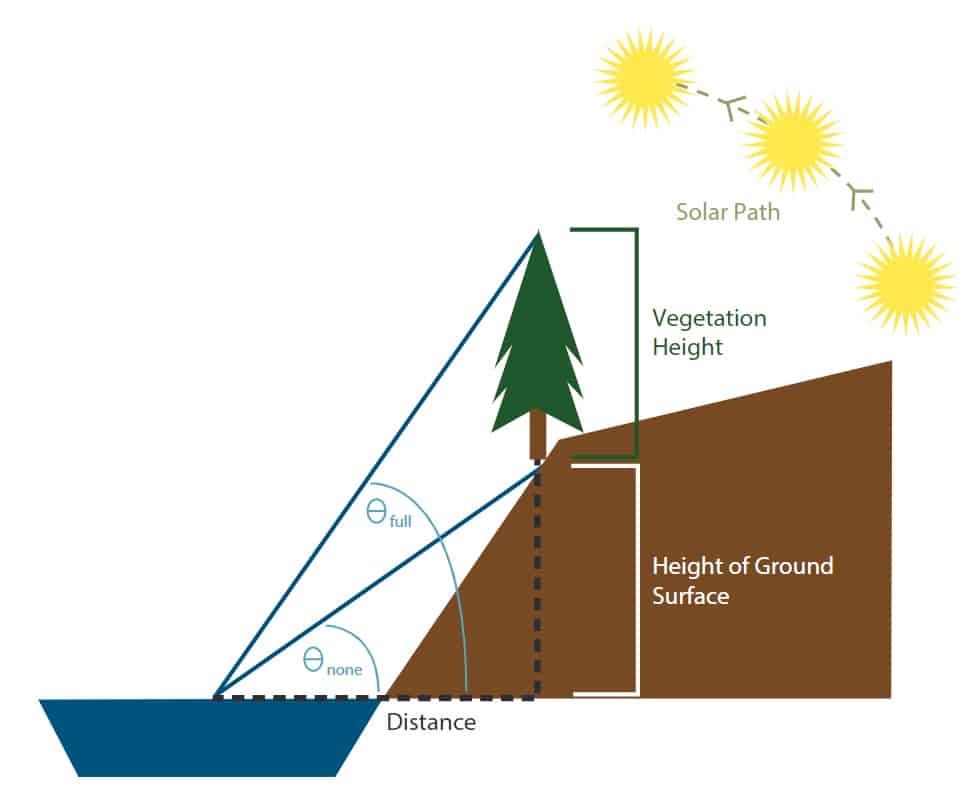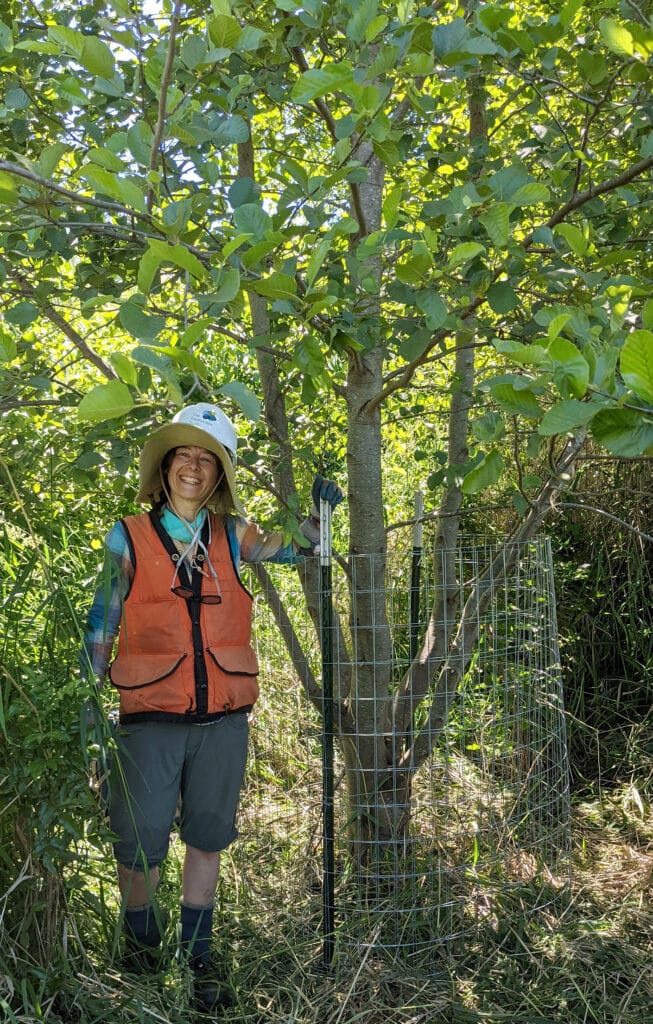Oregon Utility Launches Compliance Phase of Water Quality Trading Program with The Freshwater Trust
November 10, 2022
The Freshwater Trust (TFT) has taken a big step with water quality trading (WQT) in Oregon. The Metropolitan Wastewater Management Commission of the Eugene-Springfield area (MWMC) signed a $9.6 million contract with TFT to implement a full temperature trading program in the Willamette River basin. It is the largest such contract in TFT’s history. Once the planting of new streamside, or riparian, trees is complete in 2027, this program will support an estimated 20 restoration sites along the Coast Fork Willamette, Middle Fork Willamette, McKenzie, and their tributaries.
This phase of the program will launch in early 2023 with partners collaborating on program strategies and recruiting priority streamside sites. Planting could happen as early as fall 2023.
Testing the waters
The MWMC’s WQT program began in 2013, when TFT worked with the utility to pilot a trading approach at three restoration sites in the upper Willamette basin. The MWMC obtained a low-interest Clean Water State Revolving Fund (SRF) loan to cover the cost of constructing and monitoring the sites over five years. This innovative use of SRF to develop compliance-grade restoration projects was the first of its kind nationally and helped the MWMC secure better terms for its overall facility upgrade loan.
“The pilot saved ratepayers money and helped us iron out the kinks in advance of our wastewater permit obligations,” said Todd Miller, Environmental Services Supervisor at the City of Springfield.
“The pilot was critical to figuring out how to best install compliance-grade projects in this geography, build partnerships, and ensure that we would be ready to roll at scale when new temperature requirements from the state were handed down.”
From 2020 to 2022, TFT and the MWMC added two additional pilot projects, bringing the program total to five pilot projects.
Pre-permit projects have helped the MWMC demonstrate to its Commission, ratepayers, regulators, and partners how riparian restoration can help wastewater facilities cost effectively meet water quality obligations while also improving habitat for native fish, birds, and wildlife.

Mill Race riparian revegetation site one year after planting (2014)

Mill Race riparian revegetation site ten years after planting (2022)
Working with regulators
“The MWMC was an early pioneer of water quality trading in Oregon, looking for ways to use natural infrastructure to improve water quality,” said Tim Wigington, TFT VP of Finance & Policy. “Before the MWMC had a regulatory requirement to do so, it voluntarily began working with TFT to identify projects where streamside planting could deliver quantifiable benefits to the river.”
In 2019, the MWMC worked with TFT and the Oregon Department of Environmental Quality (DEQ) to write a WQT plan that makes this watershed approach part of its new permit for temperature compliance. The permit was released in July 2022 for public comment and was approved in October.
Water quality trading is used to improve water quality and control pollutants from multiple projects distributed throughout the watershed. New trees and shrubs block quantified amounts of solar load (considered a thermal pollutant). Those amounts are turned into shade credits. The MWMC’s WQT program will offset 440 million kilocalories per day of solar load.

Solar radiation blocked by new tree canopy is modeled in Shade-a-lator, a module of Heat Source used by the Oregon DEQ. Natural infrastructure such as streamside forests comply with water quality regulations and provide additional environmental benefits — filter excess nutrient runoff, sequester carbon, and enhance terrestrial and instream habitat.
“With trading rules now in place and several water quality trading plans to draw from around the state, the MWMC was poised to move quickly once Oregon DEQ renewed its permit,” said Chris Thomas, Senior Attorney & Policy Specialist at TFT. “We were excited to work with the MWMC to convert all the great lessons from its pilot program and other Oregon programs into a durable trading plan.”
Leveraging local partnerships
The MWMC’s WQT program will operate differently than TFT’s other riparian planting programs. In this basin, there are many knowledgeable restoration groups and an active Pure Water Partners (PWP) program. PWP is a coalition of multiple entities, including TFT and the MWMC, working together to maintain clean water and a resilient watershed. Like its other WQT programs around the state, TFT will manage the credits the program generates that keep the MWMC in compliance, while implementation and on-the-ground management of the projects will be led by the area’s watershed councils and other local restoration practitioners. In this way, the watershed benefits from local expertise and more of the funding stays in the community.
This collaborative approach means that TFT and the MWMC can bring resources together from multiple sources to enhance impacts in the basin. In addition to WQT projects for the MWMC, working with the PWP will help ensure that multiple funders can boost results. For example, at one site burned by the 2020 Holiday Farm fire, Eugene’s electric utility paid for site assessment and initial site stabilization, the MWMC’s WQT funds paid for planting on the riverbank, and other funds paid for plantings upstream and downstream.

Ten-year-old white alder tree at Mill Race riparian revegetation site
Additionally, by launching the MWMC WQT program with PWP partners, TFT can share information and resources to get work on the ground faster, more cost effectively, and with higher impact. Generally, grant funding for this project type has been redirected toward floodplain projects higher in the watershed.
“Now, local organizations can dedicate staff hours and budget to getting good restoration on the ground instead of having to spend so much time pursuing uncertain funding resources,” said Olivia Duren, TFT Restoration Program Manager.
“The MWMC program provides sustained funding for planting, stewardship and performance tracking to ensure that environmental benefits are real and last for decades and more – and this program can help pull in and leverage even more restoration dollars over time for the upper Willamette basin.”
The Freshwater Trust has more than two decades of experience in water quality trading, including drafting recommendations for the Pacific Northwest on the principles and practices to ensure trading programs have the quality, credibility, and transparency necessary to be consistent with the Clean Water Act and state and local water quality laws. TFT manages four WQT programs in Oregon that help regulated facilities mitigate their impacts on water resources.
The Metropolitan Wastewater Management Commission protects its community’s health and environment by providing high-quality wastewater services to the Eugene-Springfield area in partnership with Eugene, Springfield, and Lane County, Oregon. It serves more than 250,000 community members.
#McKenzie River #MWMC #water quality trading #Willamette #Willamette Valley
